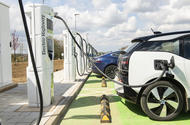Firm scales back exclusivity rights at service stations to promote variety of chargers and more competitive pricing
The Competition and Markets Authority (CMA) has agreed legally binding commitments with charger provider Gridserve, aimed at incentivising investment in EV infrastructure and promoting competition.
The industry watchdog launched an investigation last July into the Electric Highway network – acquired from Ecotricity by Gridserve two months previously – over concerns about the company’s devices dominating the British motorway network.
Excluding Tesla Superchargers, Electric Highway was found to operate some 80% of motorway chargers in Britain, with long-term (10-15-year) exclusivity agreements in place at two thirds of the network’s service stations.
The investigation aimed to determine whether these agreements with service station operators Moto Hospitality, Roadchef and Extra MSA were in breach of the Competition Act 1998.
The CMA said that by preventing the installation of devices from rival firms, the contracts were depriving EV drivers of the “benefits of competition”, namely more devices, more competitive pricing and boosted reliability.
At the time, the CMA said that charging an EV should be “as simple as filling up with petrol or diesel”.
Now Gridserve has agreed that it won’t enforce exclusive rights with those three station operators from November 2026. It will also reduce its exclusivity agreement with Moto by two years and with Roadchef by four years. Its agreement with Extra is due to end in 2026 anyway.
It has also agreed, in the shorter term, that it won’t enforce its exclusivity rights in the event that a rival firm secures government funding via the Rapid Charging Fund (RCF) to install charger devices at one of its locations. The three service-station providers have agreed “not to take any action that would undermine these commitments”, according to the CMA.
The CMA says these agreements will allow for the RCF to be rolled out as planned, thereby providing more fast chargers from more companies.
The RCF, which will take the form of a one-time lump sum investment in 2023, is expected to only be available at locations with more than one charger provider.
Gridserve said: “We immediately understood why concerns had been raised, as upgrading the EV charging infrastructure at motorway locations is an essential part of the public charging mix and of particular importance to providing the confidence for new motorists to make the transition to electric vehicles.
“In order to retain our focus on delivering the necessary charging infrastructure, Gridserve pursued a path towards settlement with the CMA at a very early stage in proceedings, which we’re pleased has now been completed.
“The settlement was reached without any decision or admission of breach-of-competition rules.”
Data from charger-mapping service Zap-Map shows that Gridserve has a 5.1% share of the UK rapid-charging network, compared with 14.6% for BP Pulse, 14.9% for Tesla and 13% for Instavolt.
The company says there are 5371 rapid devices with 12,035 connectors currently installed across the UK.
The CMA estimates that there will need to be between 280,000 and 480,000 public chargers in operation by 2030 in order to support the mass switchover to EVs. There are currently only 29,818 devices overall. Of those, 803 were installed in the past 30 days.
If the network’s growth continues at the rate, the total number of public chargers would reach around 107,000 by 2030 – when the ban on new ICE car sales in the UK will come into effect.
The CMA’s senior director of antitrust, Ann Pope, said: “We need a combination of investment now and healthy competition going forward to make sure charge points are installed at scale where people need them for a fair price.
“Today’s commitments strike the right balance. Gridserve will continue to invest in the much-needed roll-out of charge points across the country, but the exclusivity linked to its investment won’t be an undue barrier to others competing in the near future.”
Source: Autocar
